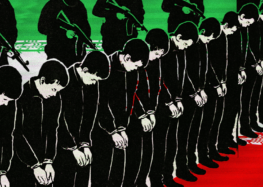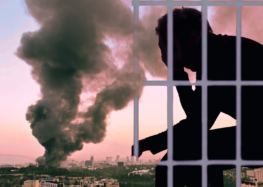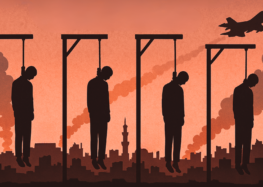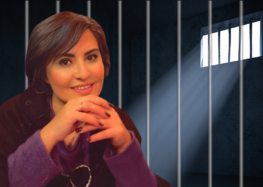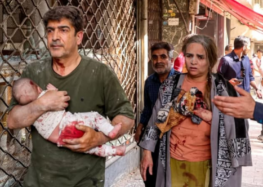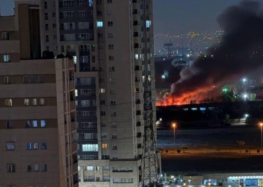Interview With Saba Vasefi: There Are No Legal Grounds for My Dismissal
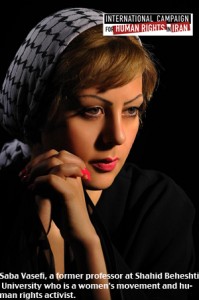
In an interview with International Campaign for Human Rights in Iran, Vasefi said that there were no legal grounds for her dismissal and against existing policies and procedures governing the employment of academic research and staff, she has not been provided for any reasons for her dismissal.
Saba Vasefi, a former professor at Shahid Beheshti University who is a women’s rights and human rights activist, is one of the faculty members who has been deprived from her teaching job during recent months, which have seen the dismissal of several other university teachers. In an interview with the International Campaign for Human Rights in Iran, Vasefi said that there were no legal grounds for her dismissal, and, in violation of existing policies and procedures governing the employment of academic research and staff, she has not been provided any reasons for her dismissal. The trend to dismiss university professors for their political and social activities has intensified recently.
Two Elm-o-San’at University professors who are known to have different viewpoints from those of the government, or who supported the students during the student protests, also received written dismissal letters. In a recent press release, Aaron Rhodes, a spokesman for the International Campaign for Human Rights in Iran, stated: “Iran’s purge of professors expressing independent views is an assault on their basic human rights and on academic freedom,” emphasizing that “These policies will further politicize and debase Iran’s universities, long a source of national pride and admiration by scholars around the world.” In her interview with the International Campaign for Human Rights in Iran, Saba Vasefi explained other aspects of such illegal treatment of university professors.
Campaign: Concurrent with increased political pressure on universities from the government and after actions such as deprivation of education of several students, it was announced that you were dismissed from your university position. What were the main reasons stated for this decision?
They didn’t provide any clear reasons, but I had received four notices in the past, so it wasn’t totally unexpected. They asked me why in my lectures I used words such as execution, woman, victim, and human rights. I did try to use alternative words such as Qisas, mother, citizen’s rights, etc., but apparently I wasn’t very successful! I was informed about my schedule for the new term, but University authorities refused to let me return to my job.
Campaign: Did you have any contact with university authorities about the decision to deprive you from teaching? Did you follow up the decision?
No. They contacted me and told me to not even appear for submitting the grades. During one of the telephone calls I received from the University, I said that the University has already settled its real score with me, when do they intend to settle the financial matters? I was told that the University has no budget and the payroll payments cannot be made yet. The University driver drove away with my signed dismissal documents while the University still owes me three semesters’ pay. This was my last contact with the University.
How do you view this University’s behavior? You are the third women’s movement activist who has been dismissed. Do you think your dismissal was related to your social activities in the area of the women’s movement?
This behavior was not just a result of personal animosities and insular thinking, and it will inevitably happen again in the future. During the first Cultural Revolution, they thought that the physical elimination of dissidents and their tools of thought from books and thesis to political parties, organizations, and professional and political groups will close the way to new thoughts, scientific thinking and dissent. But protests and strikes and the Iranian people’s renewed uprising indicates that their conclusions from history and historical events were wrong and a complete mistake. The new Iranian generation is a generation of the Revolution and is the fruit of the government’s own doing for a quarter of a century. They have miscalculated and wrongly analyzed the situation to conclude that the roots and foundation of dissident thinking must be eliminated and destroyed in the Iranian society. All through last year, we witnessed and observed the authorities’ objections to the educational system, textbooks, and topics of discussion in different academic disciplines, especially in humanities. Unfortunately, those in charge are trying to eliminate the results, not the cause, concluding that the universities, which since their establishment have continued to serve as a platform for innovation, modernization, and thought and which lived in constant turmoil during the entire Pahlavi era, have remained resolute in demanding human rights. Inevitably, they insist on treating and cutting [what they perceive to be] the roots of the issue. Censorship, monitoring, elimination, and selection, these are all expressions of one thing and that is to totally eliminate demands for rights and social justice which have roots in scientific thinking and have a scientific foundation. This is why we face dismissals, eliminations, and imprisonments at different levels. This approach not only does not have any room for modern dissidents who demand modernity, it will cause the movement to become deeper daily, and to include religious democratic groups. Main academic sources and humanities research references have not been safe from this approach; Iran’s hundreds-year-old Islamic references have not been safe from censorship. Those who are experts in history and literature are well aware of the cleansing that has taken place with Tabari History.
When order is compromised, some people’s interests face risks and they might do anything to save their domain. University authorities were not excepted from this. They warned me several times not to interfere with the students’ personal affairs and to withhold my personal opinions about literary texts. But I couldn’t remain indifferent to people who were adversely affected by the primitive laws. My colleagues did not appreciate my statements about the need for official and political organizations to accept humanitarian viewpoints.
Campaign: Iran’s Minister of Science, Research, and Technology Kamran Daneshjoo stated recently that “we do not need certain professors whose tendencies and interactions do not match that of the Islamic Republic regime.” How do you interpret his statement? Do you see the implementation of this policy in preparation for another cultural revolution?
According to their very nature and thought foundation, these people must engage in continuous and frequent eliminations and they will continue this into the future. We could call it cleansing, selecting, or revolution, it doesn’t make that much of a difference in the nature of the phenomenon. But the reasons why an organization, which came to existence as a result of Iranian people’s revolution has come to such a state can be attributed to the morality and nature of these people. Their confrontation or elimination of intellectuals and lack of regard for people’s basic rights and social justice is included in that nature. The Iranian regime has completely forgotten the revolutionary demands of Iranian people.
What are you doing after your dismissal from the University?
As in the past, I translate children’s books and continue my research activities.
Background:
Saba Vasefi, a Shahid Behesti University Professor, was dismissed from her position on January 20, 2010 along with Dr. Morteza Mardiha, a distinguished political philosophy expert. Vasefi is a researcher and human rights activist as well as a member of the Shahid Beheshti faculty. She is the third women’s movement activist who has been dismissed from work over the past few months. So far 23 distinguished faculty members of Allameh Tabatabaee’s Economics Department have been forced into retirement by the University’s Administrative Department.
The dismissals are the first after the March 4, 2010 statements by Kamran Daneshjoo, Minister of Science, Research, and Technology in which he said that faculty members who do not share the same “direction as the regime’s” and who do not have “practical commitment to velayat-e-faghih” will be dismissed. In his statements, Daneshjoo had said: “We do not need certain professors whose tendencies and interactions do not match that of the Islamic Republic regime.” This is one of the most explicit statements made about deprivation of academics from their employment on grounds of their political beliefs.

